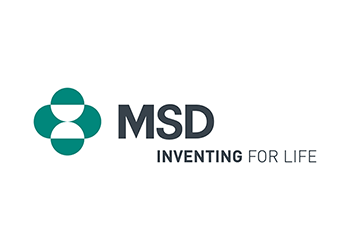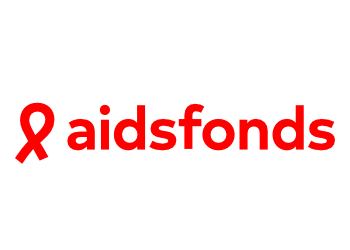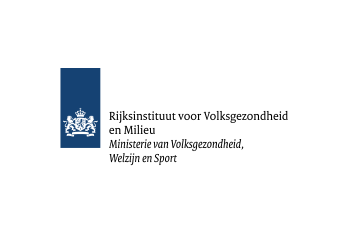In the first week of January, the Dutch corona-vaccination program started. When can people with HIV get the vaccine? Which vaccines are going to be used in the Netherlands? And has there been research done on people with HIV? And are there any interactions with HIV medication? We will answer your questions here.
(Prefer this in Dutch? Click here. Een voorkeur voor Nederlands? Klik dan hier).
Questions about the corona vaccine and HIV
Various questions about HIV and the corona vaccine have been sent to the Servicepunt (Service Point). We answer them below. If you still have questions that have not been answered, please contact the Servicepunt. You can email This email address is being protected from spambots. You need JavaScript enabled to view it. or phone 020 - 689 25 77 (Mondays, Tuesdays and Wednesdays from 14.00 to 22.00).
Please note: this article was last updated on January 26th, 2022. We will add to this article as soon as there is news.
Is vaccination against COVID-19 mandatory?
No, this is not mandatory. You do this for yourself and/or for others.
There are two reasons to get the vaccine:
- You protect yourself. By getting the vaccine, the chances are lower that you get COVID-19. The chance is also much smaller that you will have to be admitted to the hospital or pass away because of COVID-19. For the same reason for protecting themselves people get the flu jab, or travel vaccinations.
- You ensure that the chance is smaller that you can pass on the virus. When many people do not transmit the virus, the virus can no longer circulate properly. This means that we can take less measures in daily life, such as a (partial) lockdown. If you do not pass the virus on, you also indirectly protect others who cannot receive the vaccine (for example because they are allergic to one of the substances in the vaccine).
How many people have been vaccinated
You can find the amount of people that have been vaccinated in The Netherlands at the Corona Dashboard.
Which vaccines are approved?
At the time of this update several vaccines are approved. The EMA evaluates the safety and efficacy of vaccines.
- The Pfizer / BioNTech vaccine was approved on December 21, 2020
- The Moderna / NIAID vaccine was approved on January 6, 2021
- The AstraZeneca / Oxford vaccine was approved on January 29, 2021
- Janssen's vaccine was approved on March 11, 2021
- NovaVax vaccine was approved on December 20th, 2021
Is HIV a medical indication for the corona vaccination?
Yes, HIV is a medical indication for the corona vaccination (and for the booster vaccination). Since people with HIV are also offered the flu shot, HIV is also an indication for the corona vaccination. A distinction is made between "high risk" and "other medical risk groups".
People in the medical high-risk group are given priority in the vaccination and are vaccinated as soon as possible. Based on current knowledge, people with HIV are not a medical high-risk group. You can read more about the risk groups here.
HIV falls under "other medical risk groups. HIV falls under "an immune disorder or treatment with drugs that suppress the immune system (immunosuppressants) leading to reduced resistance to respiratory infections".
How does my doctor know that I should be invited as a priority? (Flu shot list)
When you’re older than 60 years, you will get invited based of your age. This also counts for the booster vaccination.
If you have HIV and are younger than 60, you will get invited based on the list for the flu shot. People who are invited annually for the flu shot (for example people with HIV) fall into the group 'other medical risk groups' for the corona vaccination. This means that you will receive a priority invitation for the corona vaccination. This also counts for the booster vaccination.
If you are not called up annually by your doctor for the flu shot, you may not be on the list for the flu shot. Then you will not receive a priority invitation for the corona vaccination.
If you (for whatever reason) do not receive an annual invitation for the flu shot, we recommend that you contact your doctor and find out if they are aware of your HIV status. To be sure, also ask if you are on the list for the flu shot. This way you can be sure that you will receive an invitation for the corona vaccination as soon as possible.
Which vaccine do people with HIV get?
An earlier version of the corona vaccination guideline for general practitioners stated that people with HIV would be offered the BioNTech / Pfizer or the Moderna / NIAID vaccine. But this guideline is already outdated: according to the current guideline of the RIVM, people with HIV are 'just' given one of the available vaccines. You can find more information here.
Can I chose what vaccine I get?
No, you cannot choose a particular vaccine. When distributing the vaccines, it was carefully considered which vaccine is most suitable for which groups of people.
When do people with HIV get the vaccine?
All the people with HIV can get vaccinated at this moment. You will find the most recent information about the order of vaccination here.
What is a booster vaccination?
The booster vaccination is a vaccination that ensures that the built-up defense against corona is preserved. The booster is given after the normal corona vaccination(s). The Moderna and Pfizer vaccines are used for the booster.
The booster can be given after:
- the 1st corona vaccination (if someone received Janssen)
- the 2nd corona vaccination (if someone received AstraZeneca, Moderna or Pfizer)
- the 3rd vaccination (if someone has received an extra vaccination because the person had not built up sufficient immunity after the first 2 vaccinations).
When do people with HIV can get their booster vaccination?
Every person with HIV can get their booster vaccination. Here you read more about when you can get the booster vaccination.
Can I get vaccinated if I participate in Ramadan?
Yes you can. You may receive a call for vaccination during the period of the Ramadan. In the video below, Arabist and theologian Hassan Barzizaoua explains that Muslims can and may be vaccinated during Ramadan.
Here you will find the video in Dutch with Arabic subtitles, and here you will find the video in Dutch with Turkish subtitles.
What if I receive a double invitation?
You may receive 2 invitations to the vaccination. For example, because you have HIV, work in healthcare and / or are older than 60. Unfortunately, multiple invitations are sometimes unavoidable, because your personal data cannot be shared just like that and the different systems therefore do not work well together.
You can choose which invitation you accept. The advice of the RIVM and the NVHB is that you use the invitation with which you can be vaccinated the fastest. It is very important that you get the first and second injection in the same place (at the GGD or the doctor). This ensures that you will receive the same vaccine twice.
What’s the best option for people with HIV?
The approved vaccines are highly effective, but there is no vaccine that can be chosen as the best option.
Are the vaccines as effective in people with HIV?
To determine how effective a vaccine is, people are not only monitored when the vaccine is investigated, but also afterwards when a lot of people receive the vaccine. In several countries the effectiveness of the COVID-19 vaccines in people with HIV is monitored. In this blog you can read what is known about the effectiveness of the different corona vaccines on people with HIV. Here you can find (in Dutch) an update about the Dutch COVIH study.
Effectiveness can be determined when many people have received the vaccine. You are never a 100% sure that the vaccine works for you, even if you do not have HIV.
Can people with untreated HIV infection or low immunity be vaccinated?
Yes, the corona vaccines are also suitable for people with untreated HIV infection or fewer than 200 CD4 cells.
Can I participate in a study of the corona vaccine in people with HIV?
A study is underway into the effectiveness of the corona vaccines in people with HIV in the Netherlands, the COVIH study. You can no longer register to participate.
Are the vaccines safe for people with HIV?
You can see in the manual "COVID-19 vaccination of immunocompromised patients" (only in Dutch) from the RIVM that people with HIV can be vaccinated with all vaccines. Several studies have now been conducted into the safety of the corona vaccines in people with HIV. This shows that the vaccines are just as safe for people with HIV as they are for people without. People with HIV have no more side effects than people without HIV. We have described a number of studies here.
Is the vaccine recommended when you are pregnant?
Yes, it is recommended that you get vaccinated with the Pfizer or Moderna vaccine if you are pregnant. You can read the information from the Dutch Association for Obstetrics & Gynecology (NVOG) here. If you are looking for more information about HIV, your pregnancy and the corona vaccination, it is best to contact your HIV outpatient clinic.
Do I have to ask my HIV specialist whether I can get vaccinated?
No, you do not have to ask your specialist. You do not need a letter of approval. Everybody with HIV can get the vaccine, even people with a low CD4 count. You will receive an invitation for the vaccination from your GP. When you are in doubt whether you want to get the vaccine, you are free to contact your HIV specialist.
What if I have doubts about whether I should get the COVID-19 vaccine?
When you have questions about the COVID-19 vaccine and HIV, contact the Servicepunt. You can email This email address is being protected from spambots. You need JavaScript enabled to view it. or phone 020 - 689 25 77 (Mondays, Tuesdays and Wednesdays from 14.00 to 22.00). They can give you more information, or they can send your question to the medical officer in the back office. Contact your HIV specialist when you feel like you need more information on you personal situation.
You can also call the Doubt Telephone (Twijfeltelefoon). You can ask all your questions about the corona vaccination at the Twijfeltelefoon. The Twijfeltelefoon is available daily from Monday to Friday between 8.30 am and 4.30 pm on 088-7555777.
Can you also be vaccinated if you are undocumented?
According to the RIVM guideline, undocumented migrants can also be vaccinated. The vaccination is free for everyone, including people without residence papers or health insurance. Nevertheless, it appears to be not yet settled in practice. Therefore, read the tips on how to make an appointment for a vaccination.
What are contraindications for the COVID-19 vaccine?
A contraindication means a reason why someone should not get the vaccine. HIV is not a contraindication, so people with HIV can get vaccinated against COVID-19.
Do I need to disclose my HIV status to get the COVID-19 vaccine?
No, you will not have to disclose your HIV status anymore. In the first week of the COVID-19 vaccinations, a form was used that asked for HIV status. The form also wrongly stated that HIV is a contraindication for the COVID-19 vaccination. HIV is not a contraindication. The Hiv Vereniging has contacted the RIVM and the NVHB (the Dutch association of HIV practitioners) and the standard form has now been amended. If you have to fill in a form asking if you have HIV, please report this to the Servicepunt.
Do the vaccines have side effects?
Yes, sometimes. The side effects are mostly pain at the injection site. Some people feel tired or get a headache after the vaccination. Most people describe the side effects as mild or moderate, and they mostly disappeared after a few days. The side effects are comparable to side effects of other vaccines.
Will there be interactions between the vaccines and HIV medication?
We do not expect there to be interactions between HIV medication and the corona vaccines.
Will there be interactions between the vaccines and (party) drugs?
We do not expect there to be interactions between (party) drugs and the corona vaccines.
Do the vaccines work against the mutated coronavirus?
As far as experts know now, the vaccines work against a mutated coronavirus. The situation is monitored extensively.
Is the vaccine suitable for people with HIV and Hepatitis C?
Yes, people with HIV and Hepatitis C can get the vaccine.
I have already had COVID-19. Is it still worth getting vaccinated?
It is not yet known if the vaccination is recommended for people who have already had COVID-19. The authorities will decide this after the corona vaccines have been approved by the EMA and the MEB (Medicines Evaluation Board). We will keep you informed.
Can you get COVID-19 from the vaccine?
No, this is not possible. It is possible that you feel a little off after the vaccination, just like when you get the flu jab.
How is a corona vaccine approved?
A vaccine is examined in a Phase I, Phase II and Phase III study. In Phase I, the vaccine is tested on a small group of people to assess the immune response and tolerance. Then in Phase II, the vaccine is tested on 100 to 200 people to see if the dosage is optimal. In Phase III, the vaccine is given to thousands of people to see how effective it is. Initially, people with HIV were not allowed to participate in the Phase III studies of the corona vaccine. But after international lobbying, people with HIV were admitted to almost all studies. So, data will become available on how well corona vaccines work in people with HIV.
The results of the studies will be sent to the EMA. The EMA will then determine whether a vaccine is effective and safe enough to use. Because of the urgent need for a corona vaccine, the EMA procedure has been speeded up. But the vaccines will be examined just as thoroughly. In addition to the EMA, the CBG (Dutch Medicines Authority) has to approve the vaccine as well. You can read more about corona vaccine approval here (in Dutch).
Once the vaccine has been approved by the EMA, Phase IV studies will be carried out. This is the phase where they check, for example, whether any side effects have been missed in the Phase I, II and III studies. When the vaccines go on the markets, there will still be monitoring.
Will my personal details be registered after the vaccination?
You give permission whether your data will be registered. It is important to keep track of who has received a vaccination. For example to invite people for the second vaccination. A special vaccination register has been set up. The privacy rules are followed for the vaccination register.
The purposes of this register are:
- Keep track of how many people have been vaccinated
- Monitor the safety of the vaccine
- be able to act quickly in unexpected situations
- Measure how well the vaccine is working
- keep the pandemic under control
The following data is registered:
- personal data
- name
- date of birth
- citizen service number (BSN)
- vaccination indication
The vaccination indication is the reason why you are eligible for a vaccination. Such as a medical indication, profession and age.
The Lareb keeps track of the side effects.
You can find more information in Dutch about registration and personal data here.
Did people in Australia get HIV from a corona vaccine?
No, that didn't happen. An Australian study on a corona vaccine by the University of Queensland, in collaboration with pharmaceutical company CSL, has been stopped. The reason for this is that some participants had false-positive HIV results after the vaccination.
A protein contained in HIV was used to make the vaccine. You can't get HIV from this protein. But your body can react to the protein as if it were HIV, and then it produces HIV antibodies. Then the HIV antibody test is a false-positive. This means that you test positive, but you don't have HIV.
The researchers were sure the participants do not have HIV. You can test for antibodies to prove HIV, but there's also a test, for instance, for the p24 protein in HIV. So, the participants who had a positive antibody test had follow-up examinations, which revealed that they did not have HIV.
However, the antibody test is the most standard test for HIV and is widely used. Because of the false-positive tests, research into this vaccine was stopped. Even though the vaccine seemed to be effective and safe.
How do the different vaccines work?
Worldwide, researchers are working on more than two hundred vaccines against COVID-19. You can read below what the different vaccines that are expected in the Netherlands entail.
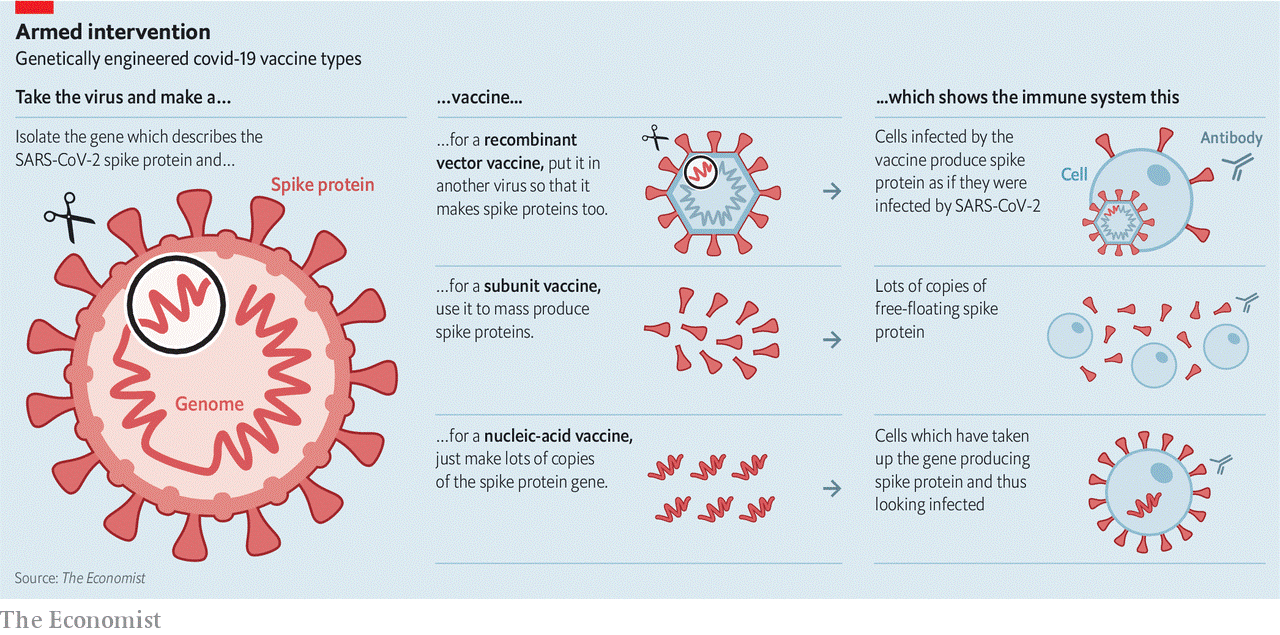
Bron: The Economist (16 april 2020)
RNA-vaccin from Pfizer/BioNTech (Comirnaty vaccine)
- The American pharmaceutical company Pfizer collaborated with the German company BioNTech to develop this vaccine. The vaccine is named Comirnaty.
- An RNA vaccine adds a new piece of RNA to immune cells. These cells are good at destroying viruses, but it takes a while before they recognise such a virus (in this case the coronavirus). The RNA vaccine allows your immune cells to recognise the coronavirus earlier. This means that, in the future, your immune system is able to deal with it more rapidly and you don't get sick. These RNA techniques are new, and there has not yet been an RNA vaccine approved for any human disease.
- Pfizer has announced that people with HIV were also included in the Phase III study. A total of 196 participants had HIV.
- The effectiveness of this vaccine is 95%. This means it works in 95 out of 100 people. The vaccination consists of two shots.
- The EMA has approved the vaccine on the 21st of December 2020. The English leaflet can be found here. The leaflet states that this vaccine is studied in people with a well-treated HIV-infection. Additionally, the leaflet states that the vaccine might be less effective in people with a weakened immune system (possible caused by HIV). It is possible that the vaccine is less effective in people with a low CD4-count or AIDS.
RNA-vaccin from Moderna/NIAID
- Moderna is an American biotech company that collaborates with NIAID (American National Institute of Allergy and Infectious Diseases).
- An RNA vaccine adds a new piece of RNA to immune cells. These cells are good at destroying viruses, but it takes a while before they recognise such a virus (in this case the coronavirus). The RNA vaccine allows your immune cells to recognise the coronavirus earlier. This means that, in the future, your immune system is able to deal with it more rapidly and you don't get sick. These RNA techniques are new, and there has not yet been an RNA vaccine approved for any human disease.
- The effectiveness of this vaccine is 94%. That means it works in 94 out of 100 people. In people with HIV, a chronic lung or heart disease, obesity, diabetes or a liver disease the effectiveness was 91%. In people older than 65 years the effectiveness was 86%. The vaccination consists of two shots.
- Moderna has included 176 people with HIV in fase III of their study.
- On the 6th of January 2021 the EMA has approved the vaccine. You can find the Dutch leaflet here. The leaflet states that the medicine has been studied in people with an HIV infection. The package leaflet also states that if you have a very weak immune system (for example, less than 200 CD4 cells), you must inform the doctor / pharmacist / nurse when you receive the vaccination.
AstraZeneca/Oxford vector vaccine (Vaxzevria vaccine)
- AstraZeneca is a British/Swedish pharmaceutical company that collaborates with the University of Oxford. The brand name is Vaxzevria.
- A vector vaccine contains a virus (in this case the coronavirus) that has been modified to such an extent, that it no longer behaves like a virus. So, it cannot make anyone ill. The vector vaccine also contains a piece of virus that the body can easily eliminate by itself, like the adenoviruses. These viruses can easily trigger a response from the immune system, and this gives you immunity from the coronavirus.
- The effectiveness of this vaccine is 60%. That means it works in 60 out of 100 people. It is not yet known whether this vaccine is just as effective in people with HIV and in people over the age of 55.
- The vaccination consists of two injections.
- AstraZeneca has included people with HIV in their Phase III study, but thesestill needs to be analysed. You can read about one participant’s experience here.The AstraZeneca/Oxford vaccine is now at the EMA for evaluation.
- The vaccine was approved by the EMA on January 31, 2021. The official Dutch can be find here.
Janssen vector vaccin
- Janssen is a Belgian pharmaceutical company.
- A vector vaccine contains a virus (in this case the coronavirus) that has been modified to such an extent, that it no longer behaves like a virus. So, it cannot make anyone ill. The vector vaccine also contains a piece of virus that the body can easily eliminate by itself, like the adenoviruses. These viruses can easily trigger a response from the immune system, and this gives you immunity to the coronavirus.
- The effectiveness of this vaccine is 67%. That means it works in 67 out of 100 people. In people over 65 years of age, the effectiveness is 74%.
- The vaccination consists of one shot.
- Janssen enrolled 1,218 people with a well-treated HIV infection in the phase III study.
- The vaccine was approved by the EMA on March 11, 2021. The side effects for the Janssen vaccine can be found here.
More information about NovaVax subunit vaccine
- NovaVax is an American pharmaceutical company.
- A subunit vaccine (also called a "subunit vaccine") is a vaccine that contains very specific pieces of a virus or bacteria (in this case pieces of the coronavirus). This makes your immune system good at recognizing this virus, so your body can immediately recognize the virus in the future and you will no longer become ill.
- NovaVax enrolled 148 people with HIV in the phase III study.
- The vaccine was approved by the EMA on December 20th, 2021.
